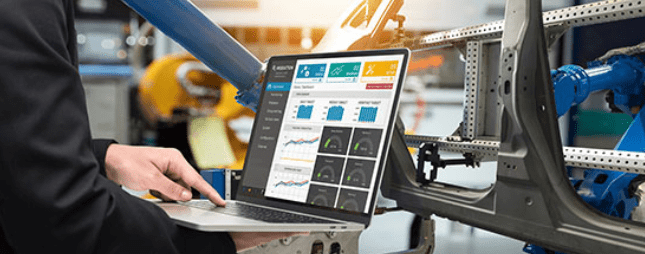In today’s fast-paced manufacturing landscape, businesses are constantly seeking ways to enhance efficiency, improve productivity, and stay competitive. One of the most effective tools for achieving these goals is Enterprise Resource Planning (ERP) software. ERP systems integrate various business processes into a unified system, enabling manufacturers to streamline operations and gain valuable insights into their performance. By centralizing data from different departments, manufacturers can make informed decisions that drive growth and efficiency.
This blog post delves into the 10 benefits of using ERP for manufacturing industry, highlighting how these systems can revolutionize manufacturing operations. Whether you are a small business or a large enterprise, understanding the advantages of ERP can help you make informed decisions about your technology investments.
For more details on ERP solutions specifically tailored for manufacturing, check out our guide on ERP for manufacturing.
1. Enhanced Productivity
One of the primary benefits of implementing an ERP system in manufacturing is the significant boost in productivity. By automating routine tasks and streamlining workflows, ERP systems reduce the time employees spend on manual data entry and other repetitive tasks. This automation allows staff to focus on higher-value activities, such as improving product quality or enhancing customer service.
Moreover, with real-time access to information, employees can make quicker decisions and collaborate more effectively across departments. The result is a more agile and responsive organization, capable of adapting to changes in market demand and operational needs.
2. Improved Data Accuracy
Data integrity is crucial in manufacturing, where decisions are often based on complex data sets. ERP systems centralize data storage, ensuring that all departments work from the same information. This reduces the likelihood of errors that can arise from using outdated or duplicated data. When everyone accesses the same source of truth, discrepancies are minimized, leading to better decision-making.
Furthermore, advanced ERP solutions offer features such as data validation and automated reporting, which further enhance data accuracy. As a result, manufacturers can trust their data, enabling them to make informed strategic decisions.
3. Streamlined Supply Chain Management
Effective supply chain management is critical in the manufacturing sector. ERP systems provide tools to manage inventory, track materials, and optimize supplier relationships. By integrating supply chain processes, manufacturers can gain real-time visibility into their supply chain operations.
This visibility allows for better planning and forecasting, reducing the risk of stockouts or overstock situations. Additionally, ERP systems can automate purchase orders and inventory replenishment, ensuring that manufacturers always have the right materials on hand to meet production demands. Ultimately, improved supply chain management leads to reduced costs and enhanced operational efficiency.
4. Enhanced Compliance and Risk Management
Manufacturers often operate in highly regulated environments, making compliance a top priority. ERP systems help organizations adhere to industry standards and regulations by providing tools for tracking compliance-related activities. With ERP, manufacturers can maintain accurate records, manage audits, and ensure that they meet quality and safety standards.
Additionally, ERP systems can identify potential risks in operations and supply chains, enabling proactive risk management. By addressing compliance and risk issues head-on, manufacturers can avoid costly fines and disruptions while safeguarding their reputation.
5. Better Financial Management
Financial management is another area where ERP systems shine. By integrating financial data with other business processes, ERP solutions provide a holistic view of a manufacturer’s financial health. This integration allows for more accurate budgeting, forecasting, and financial reporting.
Manufacturers can track expenses in real time, identify cost-saving opportunities, and make informed financial decisions. Additionally, ERP systems can streamline invoicing and payment processes, reducing the time spent on financial administration. With better financial management, manufacturers can improve profitability and ensure long-term sustainability.
6. Real-Time Reporting and Analytics
In the competitive manufacturing landscape, having access to real-time data is crucial. ERP systems offer advanced reporting and analytics capabilities, enabling manufacturers to gain insights into their operations quickly. With customizable dashboards and reporting tools, manufacturers can track key performance indicators (KPIs) and monitor operational efficiency.
This real-time visibility allows for quicker response times to emerging trends or issues, empowering manufacturers to make data-driven decisions. By leveraging analytics, organizations can identify areas for improvement and implement strategies that drive growth and efficiency.
7. Enhanced Customer Service
Customer satisfaction is vital for business success, and ERP systems can significantly enhance customer service capabilities. By providing a centralized platform for managing customer interactions, manufacturers can better track orders, respond to inquiries, and address issues promptly. ERP systems can automate order processing and fulfillment, ensuring that customers receive their products on time.
Additionally, with customer data integrated into the ERP system, manufacturers can personalize their interactions and tailor their offerings to meet specific customer needs. Improved customer service ultimately leads to higher customer retention and loyalty.
8. Increased Scalability
As manufacturers grow, their operational needs often change.Online News Website ERP systems are designed to be scalable, allowing businesses to adapt to changing requirements without significant overhauls. Whether it’s adding new users, integrating additional functionalities, or expanding into new markets, ERP solutions can grow alongside the business.
This scalability ensures that manufacturers can continue to operate efficiently, even as they evolve. Furthermore, many ERP systems offer modular features, allowing businesses to implement only the functionalities they need initially and expand as their needs grow.
9. Enhanced Collaboration
Collaboration is essential in the manufacturing industry, where multiple teams must work together to achieve common goals. ERP systems facilitate collaboration by providing a centralized platform for communication and data sharing. Employees from different departments can access the same information, enabling them to work together more effectively.
This collaborative environment fosters innovation and problem-solving, as teams can quickly share insights and address challenges. Ultimately, enhanced collaboration leads to improved productivity and a more cohesive organizational culture.
10. Cost Reduction
Implementing an ERP system can lead to significant cost reductions across various facets of manufacturing operations. By streamlining processes, reducing inefficiencies, and improving inventory management, manufacturers can lower operational costs. Additionally, the automation of routine tasks reduces labor costs and minimizes the risk of errors that can lead to costly mistakes.
Over time, the investment in an ERP system can pay for itself through improved efficiency and cost savings. Manufacturers can allocate resources more effectively, ensuring that they remain competitive in an ever-evolving marketplace.
FAQs
What is ERP in manufacturing?
ERP in manufacturing refers to integrated software systems that manage and streamline various business processes, including production, inventory, finance, and supply chain management.
How does ERP improve productivity?
ERP improves productivity by automating repetitive tasks, standardizing workflows, and providing real-time access to information, allowing employees to focus on higher-value activities.
Can ERP systems help with compliance?
Yes, ERP systems assist with compliance by providing tools for tracking regulatory requirements, maintaining accurate records, and facilitating audits.
Is ERP scalable for growing businesses?
Absolutely! Most ERP systems are designed to be scalable, allowing businesses to add functionalities and users as their needs evolve.
How can ERP enhance customer service?
ERP enhances customer service by centralizing customer data, automating order processing, and providing tools for tracking customer interactions, enabling manufacturers to respond quickly to inquiries and issues.
Conclusion
In conclusion, the benefits of using ERP in the manufacturing industry are numerous and impactful. From enhancing productivity and improving data accuracy to streamlining supply chain management and boosting customer service, ERP systems play a crucial role in modern manufacturing operations. As businesses strive to remain competitive in a challenging market, investing in an ERP solution is a strategic decision that can lead to significant improvements in efficiency and profitability.
By leveraging the advantages of ERP, manufacturers can not only optimize their operations but also position themselves for long-term success and growth. For further insights into ERP solutions tailored for manufacturing, explore more about ERP for manufacturing.



































